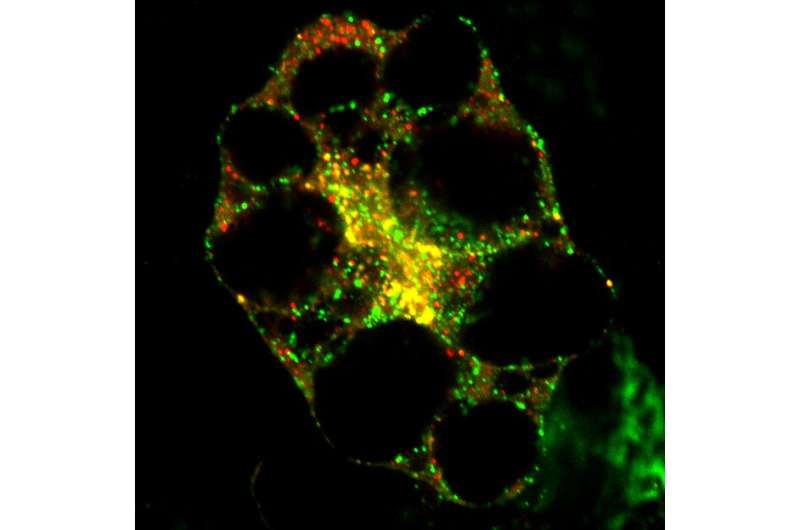When activated, the autophagy protein Beclin 1/Becn1 (red) is localized to adiponectin vesicles (green) in fat cells to facilitate their secretion. Credit: Northwestern University
Enhancing autophagy—the cellular process that breaks down and removes unneeded components—in fat tissue could help treat diabetes, according to a Northwestern Medicine study published in Cell Reports.
Beclin 1/Becn1, an autophagy-promoting protein, sensitized cells to insulin through a pathway involving the hormone adiponectin. Congcong He, Ph.D., assistant professor of Cell and Developmental Biology and senior author of the study, said that while certain aspects of the process require further study, this mechanism could be exploited to treat insulin resistance in diabetes.
"If there's something that mimics or enhances the function of adiponectin, that might be therapeutically effective against diabetes," said He, who is also a member of the Robert H. Lurie Comprehensive Cancer Center of Northwestern University.
Autophagy plays a key role in a number of processes: removing long-lived and misfolded proteins, clearing damaged organelles, and regulating growth and metabolism. A major regulator of autophagy is a specific protein, Beclin 1.
In normal organisms, Beclin 1 is only activated under certain stress conditions, such as a lack of nutrients or oxygen. Activation of Beclin 1 triggers autophagy, recycling dysfunctional cellular structures and hopefully ameliorating the stressors that triggered the process in the first place.
In a previous study, scientists from He's team engineered mice with a Beclin 1 mutation enhancing its function. They found these mice had prolonged lifespan in addition to delayed aging in the heart and kidneys. The investigators also discovered that these mice were glucose intolerant but more insulin sensitive.
"They cannot clear glucose, a phenotype similar to that of type 1 diabetes; but they respond better if you inject them with insulin," He said. "They have insulin storage defects, but we did not understand why they were more insulin sensitive."
In the current study, investigators measured the blood of Beclin 1-enhanced mice, finding high levels of adiponectin. This hormone, secreted from adipose tissue (fat), helps activate the AMPK metabolic pathway, a general regulator that aids metabolism, according to He. Knocking out the adiponectin receptor prevented activation of AMPK and subsequent sensitization of insulin response, so He and her colleagues sought to examine the precise mechanism at play.
They found that Beclin 1 was the culprit: In normal mice, Beclin 1 is largely bound to other inhibitory molecules, only released when activated. In the mutant mice with enhanced autophagy, there is much more "free" Beclin 1, creating a larger pool of the protein to translocate to adiponectin vesicles, facilitate their secretion to the blood and improve insulin sensitivity.
Over-activating Beclin 1 in insulin-secreting B cells could be harmful as it reduces insulin storage, but activating Beclin 1 and adiponectin secretion in fat cells could help sensitize patients with diabetes to insulin, according to He. This could be accomplished with a small molecule agonist that specifically activates the adiponectin pathway, or through intermittent promotion of autophagy with Beclin 1, or through another autophagic inducer such as fasting and physical exercise.
"Metabolic tissues such as fat are likely to be more sensitive to autophagy than insulin-storing B cells, so the idea is that if you intermittently fast or exercise, it can activate autophagy in fat earlier than other parts of the body and be metabolically beneficial," He said.
Kenta Kuramoto, Ph.D., a postdoctoral fellow in the He laboratory, was lead author of the study.
More information: Kenta Kuramoto et al, The autophagy protein Becn1 improves insulin sensitivity by promoting adiponectin secretion via exocyst binding, Cell Reports (2021). DOI: 10.1016/j.celrep.2021.109184
Journal information: Cell Reports
Provided by Northwestern University






















